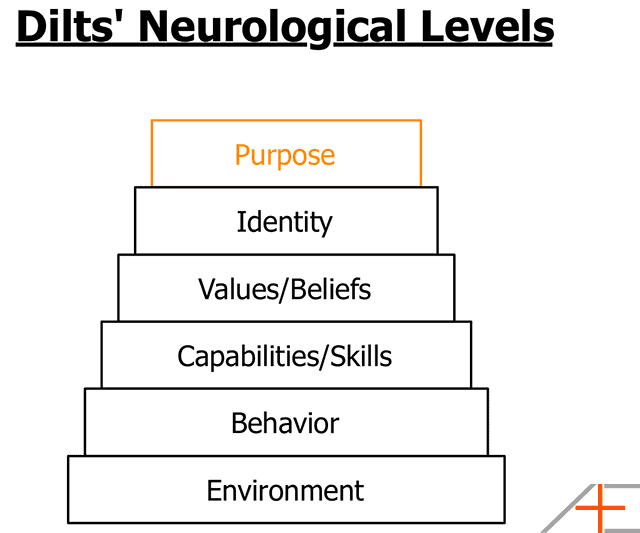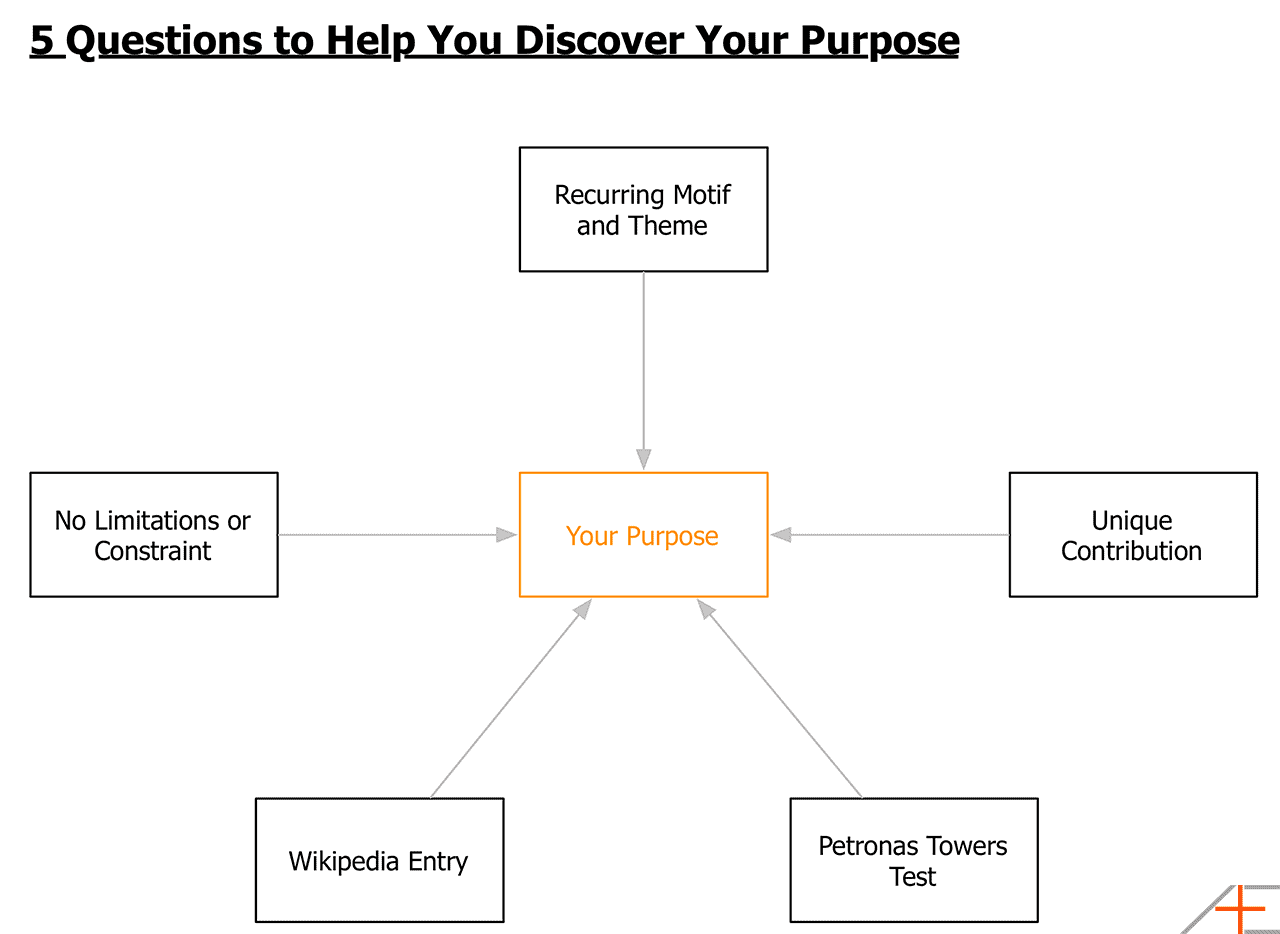
One of the more common email requests we get is from readers wanting to know how they can uncover their purpose, or story, in life.
Why have a purpose in life?
If you’ve been reading Asian Efficiency for a while, you’ll know that we discuss the idea of goals, outcomes and measuring actions a lot. And all of this is within the focus of having a purpose in life – in essence, the purpose provides a filter for your actions, behaviors and goals, and tells you when you are and when you aren’t doing productive things towards those.
Before we dive in here are a couple of things to keep in mind:
- We make no warranty as to what to do with your purpose once you’ve discovered it. You may find out that your purpose in life has no practicality in terms of monetary exchange in the modern world, and that you can’t “make a living” doing it. Ideally of course, we would uncover a purpose that is of value to others too.
- Language is a limiting factor when it comes to big ideas like life purposes. But go ahead and give it a go anyway!
- We’ll be looking at purpose from… you guessed it, 5 different perspectives. This is because as real human beings, our lives are complex. We are NOT the one-dimensional characters that are portrayed on television and in Hollywood movies.
Dilts’ Neurological Levels

The above is a model from NLP called “Dilts’ Neurological Levels”. A lot of NLP is feel-good woo-woo and wishful thinking, but there are elements of it that undoubtedly work when it comes to tweaking our performance and lives. The above model is one such part, and very relevant in our discussion of purpose here.
At the very top sits purpose, which is what governs everything else in your life.
One level down is your identity, or your sense of being and who you are. It is possible to have multiple identities, like “father”, “sister”, “banker”, “marathon runner”.
Below that lies your values and beliefs, which are the unspoken rules governing your decisions, actions and behaviors. They are the snap-moment guides for making tough decisions and for what you will and will not do in life.
Further down are capabilities which is another way of saying “ability” or “skill”. This is also where your limitations are defined.
The bottom two levels are behaviors and environment. Behaviors are the things we do. Environments are the events and things around us.
An interesting thing about this model is that it creates a clear distinction between action, identity and purpose (and all the other levels). For example, doing something that that society considers “bad” (a behavior) doesn’t necessarily make you a bad person (an identity) – they are two separate levels. Similarly, what you do on a day-to-day basis (your behavior), what you were trained to do (your capabilities), what roles you play (your identities) and your purpose may all be slightly different.
The 5 Questions About Purpose
With that out of the way, here are the 5 important questions you need to ask yourself to uncover your purpose:
- If you could do anything with your life, without limitation or constrain or consequence, what would it be?
- What has been the recurring motif or theme of your life up to this point?
- What unique value do you feel you can contribute to the world and humanity as a whole?
- The Power of Story test: What would make you walk across a plank set up between the Petronas Towers in Kuala Lumpur?
- At the end of your life, after all your accomplishments and actions are said and done, what will your Wikipedia entry read?

Now let’s look into these in more detail.
1. If you could do anything with your life, without limitation or constrain or consequence, what would it be?
This is the basic question that people are usually asked when it comes to setting goals. But it is more than that – this particular question is very practical for discovering, deep down, what it is you want out of life.
The great thing about it is that it emphasises no limitation, no constraint and no consequence – and therefore no judgement. Every single one of us has a darkness within, and this question is the opportunity to let that dark side go wild – to list out our deepest, darkest desires. Because even though we may suppress or hide it, that dark side is indeed part of us and part of why we are here.
This question also cancels out any idealism we may have about why we are here living – life is to be enjoyed as well, and answering this particular question addresses that.
2. What has been the recurring motif or theme of your life up to this point?
What we have done in the past is part of us, and at least some indicator of why we’re here today. Asking what the main theme of our past is is one way to tell what we naturally gravitate towards and what patterns we tend to repeat in our lives.
A follow-up question to this would be: would you change this motif or theme? Just because something has been part of us it doesn’t mean that it has to be going forward.
It is important to understand that most of our early lives were the result of arbitrary influences from parents, society, school and religion. We didn’t consciously choose what we learned back then, but we do have a choice going forward. This is not to say that everything learned arbitrarily was bad – there was and is definitely value in some of what we learned in the past, but now we get to choose what to keep and what to redefine.
3. What unique value do you feel you can contribute to the world and humanity as a whole?
The is the feel-good “light side” of purpose – the part that addresses the idealist in all of us. It is the giving side, the idealism side, the “there is something greater than myself” side of purpose.
You can go as micro or as macro as you want. It may be simply contributing something to your immediately family or your community. It could be contributing something to your faith, your nation, or humanity as a whole.
This question should take into consideration your skills and capabilities and what it is you’re really good at.
4. The Power of Story test: What would make you walk across a plank set up between the Petronas Towers in Kuala Lumpur?

This question comes from Jim Loehr’s phenomenal The Power of Story (review). He states that whatever that thing is that would make you cross the scary-as gap between those two towers in a single plank, is your purpose in life.
We like to think of this as a “life-threatening scenario” that provides clarity and helps you define what it is that you would really put on the line in exchange for life itself. This could be anything – don’t limit yourself with a moral lens here, and don’t worry if it conflicts with some things you have answered for earlier questions (we’ll put this all together in a bit).
In truth, you may find that nothing short of your own survival would make you cross that plank – and that is perfectly fine.
5. At the end of your life, after all your accomplishments and actions are said and done, what will your Wikipedia entry read?
This is our updated version of the standard “eulogy test” that self-help gurus like to ask.
Another way of asking this is “what do you want down on public record as your life?”
This particular question satisfies our egos, which are an important part of us.
The important thing to remember here is that Wikipedia is objective and moderated – both the good and bad about your life will be stated here, so the only way to ensure that it says what you want it to is by really living out your defined purpose in life.
Putting It All Together
If you’ve answered all 5 questions you’ve probably discovered quite a few things about yourself, and why you are really here.
The next step is to take your 5 answers and distill them – simplify the core essence of it all down into 1-2 sentences, which describe your purpose. You can and should make it sound as good or as bad as you like – it is for your eyes only.
Once you have this, you can use it as a filter or lens for everything that you do – does a particular action take you towards or away from your purpose?
Is what you’re doing right now beneficial towards you purpose? Remember, detours in life are sometimes necessary, but don’t go too far off course.
Photo by: kalleboo

Hey you guys,
I thought this TedTalk was very fitting too.
https://www.ted.com/talks/phil_hansen_embrace_the_shake.html?utm_content=addthis-custom&utm_campaign=&utm_source=facebook.com&awesm=on.ted.com_pFxM&utm_medium=on.ted.com-twitter&source=twitter#.UbK244_ml4V.twitter
Thanks for sharing Nhu.